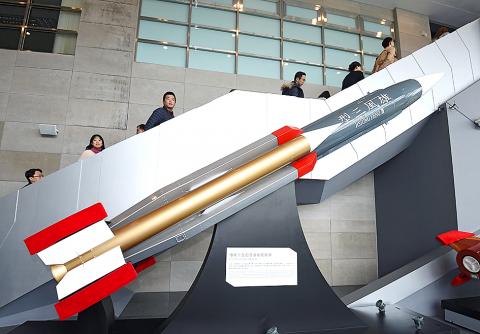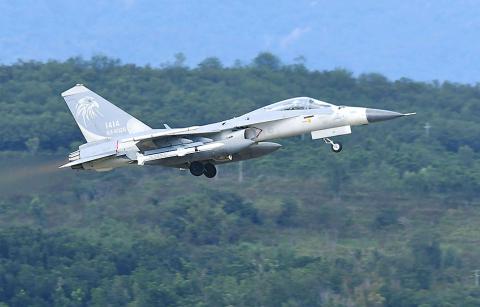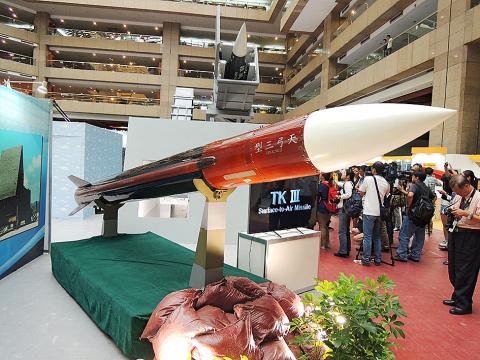Taipei and Washington have signed an agreement to share information on scientific research that would allow representatives of Taiwan’s research institutions, including the Chungshan Institute of Science and Technology and the Ministry of National Defense’s Armaments Bureau, to visit national defense research institutions and laboratories in the US next year, an unnamed senior military official said yesterday.
Such US facilities have never been open to Taiwanese researchers, the official said, adding that the deal would greatly benefit Taiwan’s self-defense capabilities, including the domestic production of military vessels and aircraft.
Cooperation with the US is expected to shorten the institute’s development and production time and could provide a breakthrough, as well as reduce the time needed for ongoing enhancement programs for the Tien Kung (“Sky Bow”) surface-to-air missile, the Tien Chien (“Sky Sword”) air-to-air missile and the Hsiung Feng (“Brave Wind”) anti-ship missile systems, the source said.

Photo: Liu Hsin-de, Taipei Times
It could also help the institute cut costs, the official said, adding that the benefits are difficult to measure.
The official did not specify which facilities Taiwanese representatives would be allowed to visit, saying that would depend on US officials.
Taiwan’s resources are limited, as the annual defense budget is only about US$10 billion, the official said, adding that as it is difficult to compete with China in terms of quantity, Taiwan needs to focus its resources on key projects.

Photo: Yu Tai-lang, Taipei Times
Although Taiwan is confident about its technological capabilities, the US is the world leader in the arms industry, said Democratic Progressive Party Legislator Wang Ting-yu (王定宇), coconvener of the Legislative Yuan’s Foreign Affairs and National Defense Committee.
If Taiwanese and US researchers can visit each other, it would help Taiwan achieve breakthroughs in military technology, he said.
More importantly, exchanges between researchers are on a higher level than joint military exercises, Wang said, adding that they would symbolize close relations with the US.

Photo: Lo Tien-pin, Taipei Times
The passage of US legislation that is advantageous to Taiwan, including parts of the latest National Defense Authorization Act and the Taiwan Travel Act, have created opportunities to facilitate equal and mutually beneficial exchanges between Taiwan and the US, said Chinese Nationalist Party (KMT) Legislator Lu Yu-ling (呂玉玲), the committee’s other coconvener.
However, as Taiwan is in desperate need of actual assistance from the US, mutual exchanges between military research institutions would provide a significant boost to Taiwan’s self-defense capabilities and the development of the domestic defense industry, she said.
As relations warm between North and South Korea, and North Korea and the US, Taiwan cannot become a bargaining chip in international relations, Lu said.
Aside from improving Taiwan-US relations, if Taiwan engages in further exchanges with the US military and research institutions, it could also improve the nation’s self-defense capabilities, in turn elevating its importance and position on the international stage, she said.

AGING: As of last month, people aged 65 or older accounted for 20.06 percent of the total population and the number of couples who got married fell by 18,685 from 2024 Taiwan has surpassed South Korea as the country least willing to have children, with an annual crude birthrate of 4.62 per 1,000 people, Ministry of the Interior data showed yesterday. The nation was previously ranked the second-lowest country in terms of total fertility rate, or the average number of children a woman has in her lifetime. However, South Korea’s fertility rate began to recover from 2023, with total fertility rate rising from 0.72 and estimated to reach 0.82 to 0.85 by last year, and the crude birthrate projected at 6.7 per 1,000 people. Japan’s crude birthrate was projected to fall below six,

US President Donald Trump in an interview with the New York Times published on Thursday said that “it’s up to” Chinese President Xi Jinping (習近平) what China does on Taiwan, but that he would be “very unhappy” with a change in the “status quo.” “He [Xi] considers it to be a part of China, and that’s up to him what he’s going to be doing, but I’ve expressed to him that I would be very unhappy if he did that, and I don’t think he’ll do that. I hope he doesn’t do that,” Trump said. Trump made the comments in the context

SELF-DEFENSE: Tokyo has accelerated its spending goal and its defense minister said the nation needs to discuss whether it should develop nuclear-powered submarines China is ramping up objections to what it sees as Japan’s desire to acquire nuclear weapons, despite Tokyo’s longstanding renunciation of such arms, deepening another fissure in the two neighbors’ increasingly tense ties. In what appears to be a concerted effort, China’s foreign and defense ministries issued statements on Thursday condemning alleged remilitarism efforts by Tokyo. The remarks came as two of the country’s top think tanks jointly issued a 29-page report framing actions by “right-wing forces” in Japan as posing a “serious threat” to world peace. While that report did not define “right-wing forces,” the Chinese Ministry of Foreign Affairs was

PREPAREDNESS: Given the difficulty of importing ammunition during wartime, the Ministry of National Defense said it would prioritize ‘coproduction’ partnerships A newly formed unit of the Marine Corps tasked with land-based security operations has recently replaced its aging, domestically produced rifles with more advanced, US-made M4A1 rifles, a source said yesterday. The unnamed source familiar with the matter said the First Security Battalion of the Marine Corps’ Air Defense and Base Guard Group has replaced its older T65K2 rifles, which have been in service since the late 1980s, with the newly received M4A1s. The source did not say exactly when the upgrade took place or how many M4A1s were issued to the battalion. The confirmation came after Chinese-language media reported